Historical Places in Pakistan "Historical Pakistan Part-1"
Hi Guys, How are you all. I hope you all will be fine.
Pakistan has a big collection of Historical places which are relate us to the old history of the current area.
Here in this article I am going to share with you collection of some Historical Places. I hope you will like them. Many international tourists visit these place for collection of old generation history.
Historical Pakistan Part-1
1- Mohenjo-Daro:
Mohenjo-Daro is actually the contemporary name of the site which is in Sindhi language and it means ‘Mound of Dead’. The original name of the place is still unknown but according to some historians, he possible ancient name was ‘Kukkutarma’ which means’ City of Cockerel’. This name is not authentic and for this reason it never gained any official status.
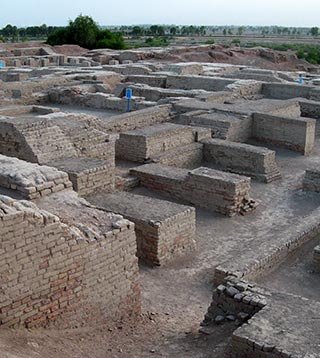
Mohenjo-Daro is probably the most attractive historic lace in the country which is famous all through the world. It is part of the Larkana District of the province of Sindh and it is just at the right bank of the mighty River Indus. The archeological ruins of the place take us back into the history till 3000BC. So, this makes it a 5000 years old city which is the oldest civilization known to man after the Chinese. It was also the urbanized and the largest civilization in South Asia. They were first discovered in the year 1922 but, it was the year 1965 when significant excavations were completed. Now, people come from all over the places to witness this historic site.
2- Shalamar Gardens:
The site of the historic Shalimar Gardens was the property of Arain Mian Family of Baghbanpura. Shah Jahan rewarded them with the ‘Mian’ royal title for its services and contribution to the then Mughal Empire. The head of the family, Mian Muhammad Yusuf surrendered the property of to the Mughal Empire as he was pressurized by the Royal engineers. They were interested in that particular location because of its ideal positioning and the quality of the soil. But, Shah Jahan as a return favor granted the Mian family with the governance of Shalimar Gardens. It remained under their governance for nearly 350 years.
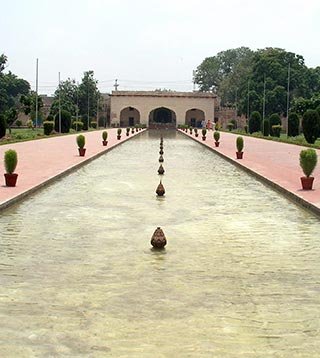
Field Marshal Ayub Khan nationalized the place in the year 1962 because the Arain Mian Family opposed him with his Martial Law imposition in the country. The lively festival of Mela Chiraghan was an yearly event until 1958when Field Marshal General Ayub ordered against it.
3- Lahore Fort:
Lahore Fort also known as Shahi Qila is located in north-western corner of the historical city of Lahore. Though irregular in scheme the fort measures about 427 meters east-west and 335 meters north-south excluding the fortification wall added later during the Sikh rule of Maharaja Ranjit Singh (1799 – 1839 A.D).
The chequered history of the fort is a living witness of the zenith and nadir of the Mughals, the Sikhs and the colonial rulers. The art of the fort building is reflects a series of monuments from Emperor Akbar (ruled: 1556 – 1605) to the Aurangzeb (ruled: 1658 – 1707 ).
The court of Emperor Akbar occupies the south-east area of the fort but most of the building have been extinct and the Masti / Akbari is still facing the Maryam Zamani Mosque. The northern half of the fort with its architectural beauty is divided into six quadrangles; from Akbari Gate to Shish Mahal.
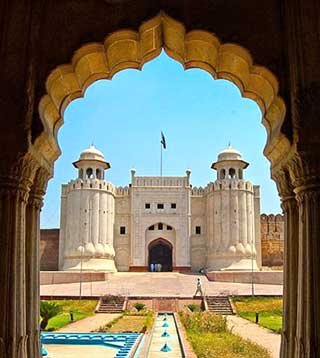
Lahore Fort and Shalamar Garden are enlisted as World Heritage Sites in 1981 by UNESCO (United Nations Educational, Scientific and Cultural Organization). Presently the administrative control of Lahore fort and Shalamar Garden lies with Punjab Government, under Archaeology and Tourism Department of Punjab. A reasonable amount was allocated by Punjab Government in the year 2005-6, for the restoration and conservation of these two monuments.
4- Texila Museum:
Taxila city is 35 km, 20 minutes drive from Islamabad moving towards north-west where the civilization of Gandhara exists. While traveling on GT road, after crossing Margalla Hills, just turning left from Taxila bypass at Khanpur Lake road about 4 km there is Taxila Museum. It’s a site museum where the collections of gandhara art are placed, which is about of 600BC to 700BC. Two beautiful & well maintained gardens are also attached with the museum’s building, for visitors to relax and enjoy the natural environment and weather.
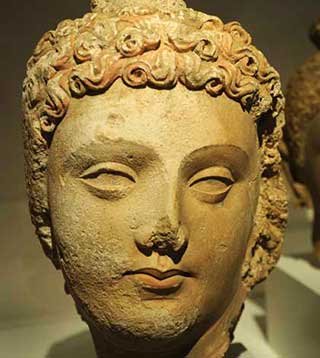
5- Rohtas Fort:
Rohtas Fort, or Qila Rohtas as the natives call it, is a garrison fort with great historical value. It is located in Pakistan’s most populated province, Punjab, on the GT road. It is at a distance of approximately 8 km from the city Dina in district Jhelum. The Afghan king, Farid Khan, more commonly known as Sher Shah Suri, had Todar Mal build this fort in the 16th century. Farid Khan is the founder of the Suri Empire. The circumference of the fort is 4 km. Its construction took as many as 8 years for completion. Meanwhile, Sher Shah Suri died on 22 May 1545 during the siege of Kalinjar Fort due to a fire erupted in result of a gunpowder explosion in his store room.
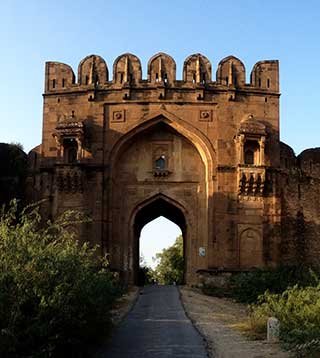
The fort with its distinct architectural style, massiveness and historical significance is enlisted as UNESCO World Heritage Site in 1997 A.D.
6- Katas Raj:
Katas Raj is located about 16 kilometers (10 miles) from Kallar Kahar on the road between Kallar Kahar and Choa Saidan Shah, in District Chakwal of province Punjab, Pakistan. It is situated about 40 kilometers from the city of Chakwal making it a popular tourist place among people of Chakwal. Basically, Katas Raj is a temple complex consisting seven ancient temples called Satgraha, some temples of middle ages and some recently constructed temples. The oldest temple dates back to 6th century A.D. All these temples are built around a pond acknowledged holy to Hindus.
In the mountains of Pothohar Plateau, these Hindu temples are famous worldwide. A large number of people belonging to Hinduism visit these temples each year to perform their religious practices and rituals. The pond in the center of temples is considered holy among Hindus because they believe it is filled by the tears of Shiva and taking bath in this pond provides forgiveness to sins.
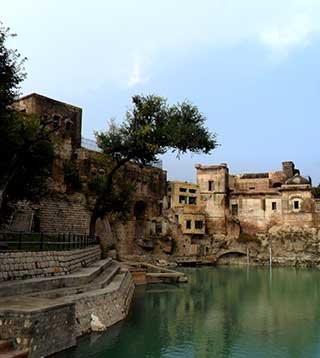
It is said old name of Katas Raj was Kataksha, which in classic Sanskrit means “God’s Tears”. A visit to Kataj Raj Temple provides great information about the history of religions and about Hinduism. It would be better to take some time to visit Kalar Kahar Lake nearby for spending a picnic and boating.
Great Post.
But why did you miss Badshahi Mosque. It is such a great Historical mosque 🕌 and it so beautiful.
Inshallah Next time I will
Very informative and nice article.
wow...very nice
wow your post is very nice
Thanks
Congratulations @ahmad80500! You have completed the following achievement on Steemit and have been rewarded with new badge(s) :
Click on the badge to view your Board of Honor.
If you no longer want to receive notifications, reply to this comment with the word
STOPDone
Very informative and nice article.
Good post
Posted using Partiko Android
great post
your post get free upvote resteem and follow by @michealclauri
Get Free Upvotes and Follow + Resteem Click Here